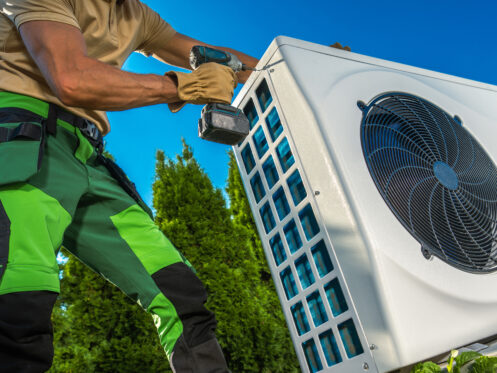As a homeowner in San Diego, CA, finding the most energy-efficient and cost-effective methods to maintain a comfortable indoor environment is a top priority. One innovative solution that is rapidly gaining popularity is the heat pump. These versatile systems offer energy-efficient heating and cooling for year-round comfort and are an ideal choice for the San Diego climate.
Heat pumps are unique HVAC systems that can both heat your home during the cooler months and cool your home during warmer months, offering an energy-efficient alternative to traditional furnaces and air conditioning systems. Heat pumps use refrigeration technology to transfer heat from one place to another, moving heat to the desired location rather than generating it directly. This process is much more energy-efficient when compared to traditional heating and cooling methods, providing significant savings on your utility bills and reducing your carbon footprint.
Continue reading as we delve into the advantages of heat pumps, including their lower energy consumption, increased comfort, and reduced environmental impact. Additionally, we’ll discuss the different types of heat pumps available, factors to consider when selecting the most suitable system for your home, and the importance of working with our skilled HVAC professionals to ensure proper installation and maintenance.
1. Advantages of Heat Pumps
There are several key benefits of heat pumps that make them an appealing choice for homeowners:
Energy Efficiency
Heat pumps are highly energy efficient, as they transfer heat rather than generating it directly. This efficiency can result in reduced energy consumption and significant savings on your utility bills, making heat pumps a cost-effective option for your home.
Year-Round Comfort
As heat pumps can both heat and cool your home, they provide consistent comfort throughout the year. Their versatility makes them an ideal solution for the San Diego climate, offering efficient heating during cooler months and relief from the heat during the warmer months.
Eco-Friendly Solution
By using electricity and refrigeration technology to transfer heat, heat pumps have a reduced environmental impact compared to traditional HVAC systems that rely on combustion to generate warmth.
Quiet Operation
Most heat pump models operate with minimal noise, adding to your indoor comfort by maintaining a peaceful atmosphere in your home.
2. Types of Heat Pumps
There are several types of heat pumps available, catering to diverse needs and preferences. When considering a heat pump for your home, it’s essential to familiarize yourself with the different options:
Air-Source Heat Pumps
Air-source heat pumps are the most common type and work by extracting heat from the outdoor air. These systems are suitable for moderately cold climates, like San Diego, and offer efficient heating and cooling.
Ground-Source (Geothermal) Heat Pumps
Ground-source, or geothermal heat pumps, extract heat from the ground or nearby water sources. While these systems require more investment upfront, they are incredibly efficient, providing long-term savings and consistent comfort.
Dual-Fuel (Hybrid) Heat Pumps
Dual-fuel or hybrid heat pumps combine the energy-efficient benefits of heat pumps with the power of a traditional furnace. These systems automatically switch between the heat pump and furnace, depending on temperature conditions, to provide the most efficient heating option.
3. Choosing the Right Heat Pump for Your Home
Several factors need to be considered when selecting the most suitable heat pump for your home:
Determine the Appropriate Size
It’s crucial to choose a heat pump system with the right capacity to efficiently heat and cool your home. Our professional HVAC technician can help you assess your home’s size and insulation to determine the most suitable heat pump size.
Compare Energy Efficiency Ratings
To maximize the energy-saving benefits of heat pumps, opt for systems with high-energy efficiency ratings, such as HSPF (Heating Seasonal Performance Factor) and SEER (Seasonal Energy Efficiency Ratio).
Assess Installation Feasibility
Verify if your property is suitable for the chosen type of heat pump. For example, ground-source systems require sufficient land to install the necessary ground loops.
4. Proper Installation and Maintenance for Optimal Performance
Ensuring correct installation and regular maintenance is essential to maximize the efficiency and longevity of your heat pump system:
Professional Installation
Work with our certified and experienced HVAC technician for heat pump installation. Proper installation is crucial so that the system operates at peak efficiency and adheres to safety standards.
Regular Preventive Maintenance
Routine maintenance by our qualified technician can help you identify and address potential issues, maintain optimal system performance, and extend your heat pump’s lifespan. Key maintenance tasks include cleaning filters, checking refrigerant levels, inspecting electrical components, and examining coils.
Conclusion
By understanding the benefits, types, and essential considerations for heat pumps, you can make an informed choice that provides year-round comfort, energy efficiency, and cost savings for your San Diego, CA home. Our team at Friar’s Plumbing Heating & Air is committed to helping you explore the advantages of heat pumps and providing expert installation, maintenance, and HVAC services in San Diego to ensure long-lasting performance. Trust our experienced technicians to guide you through the heat pump selection process, installation, and ongoing HVAC system care. Contact us today.

